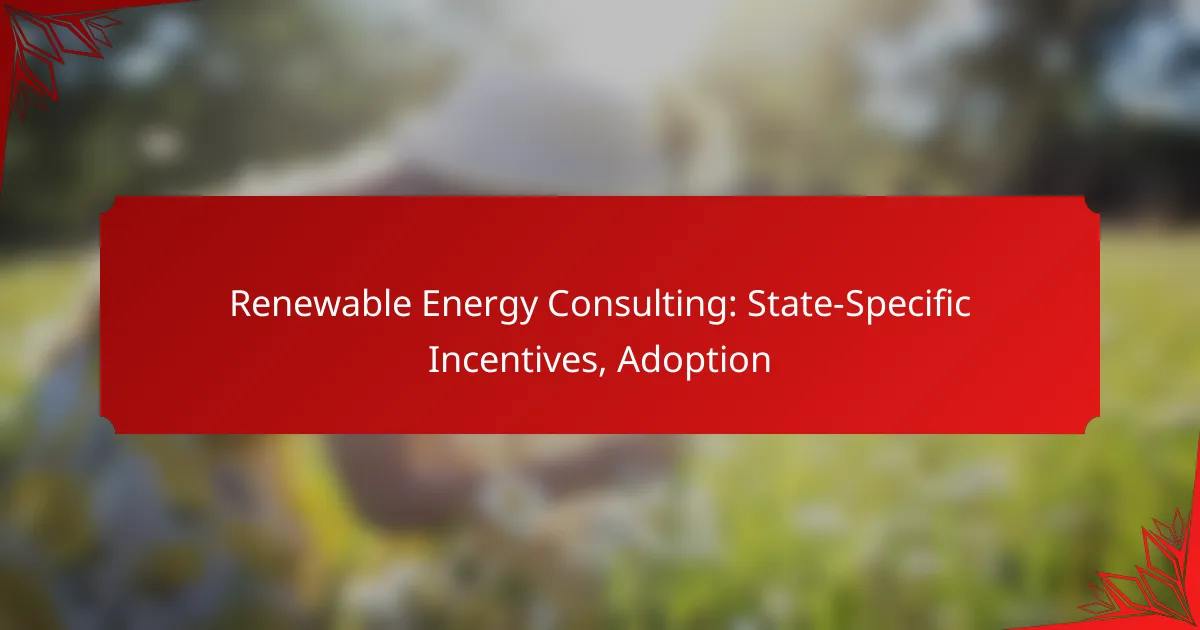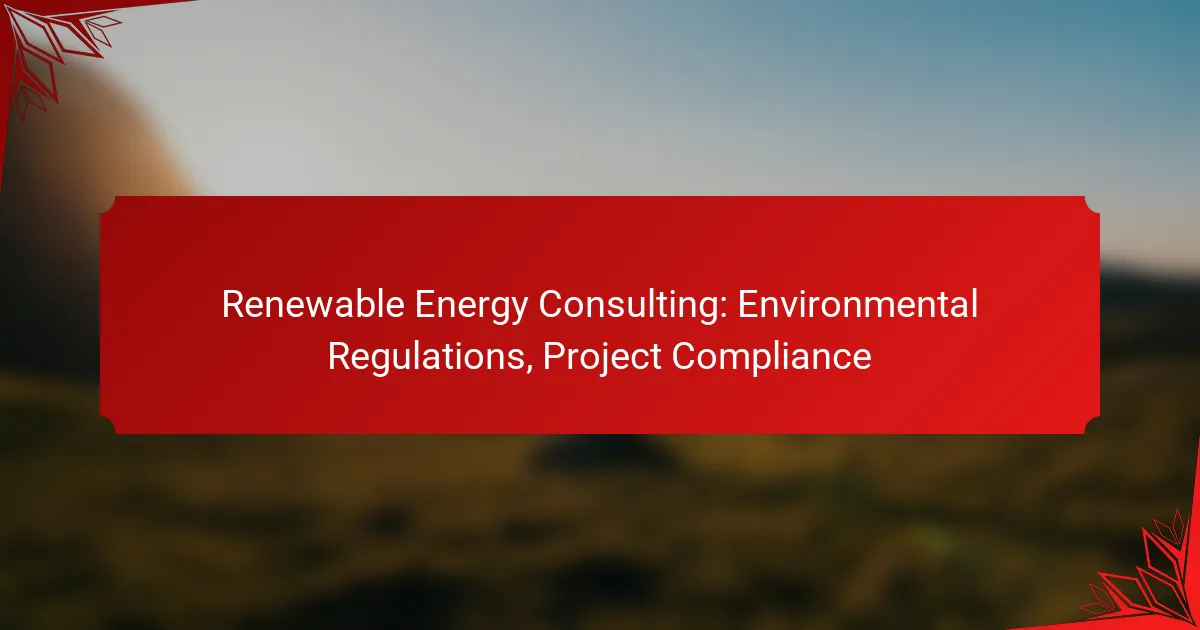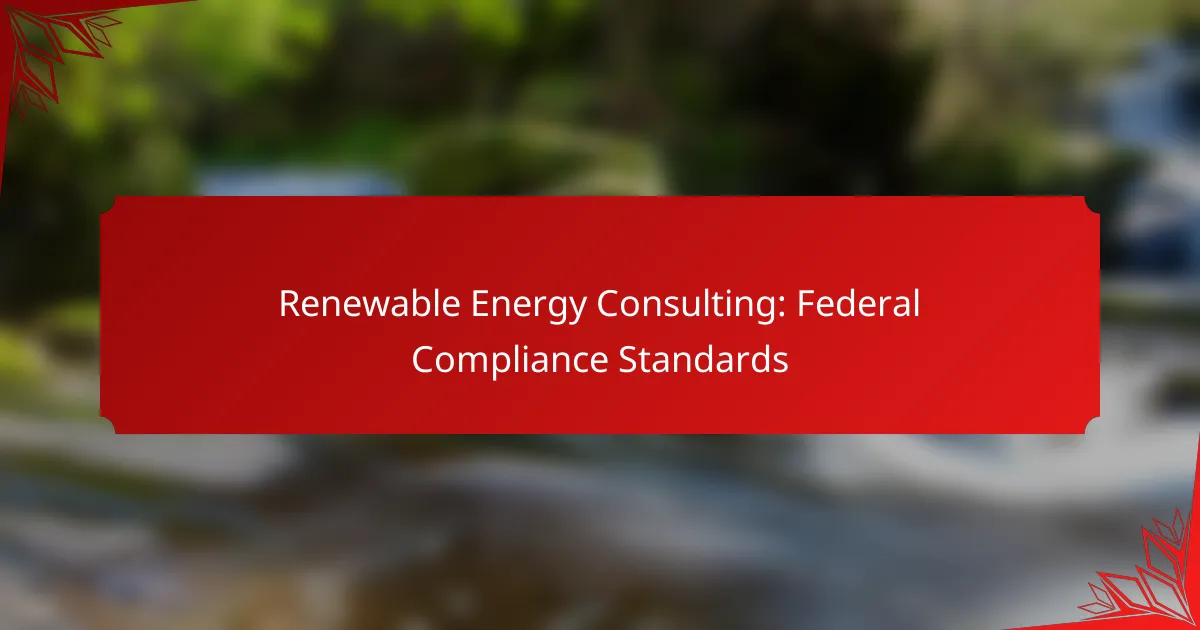Renewable energy consulting provides essential support for individuals and businesses looking to adopt sustainable energy solutions while navigating state-specific incentives. From California’s comprehensive services that include solar and wind guidance to Texas’s financial incentives like tax exemptions and rebates, each state offers unique opportunities to facilitate the transition to renewable energy. In New York, various programs such as energy storage systems and community solar initiatives further enhance accessibility and affordability for businesses. Understanding these localized incentives is crucial for maximizing the benefits of renewable energy adoption.
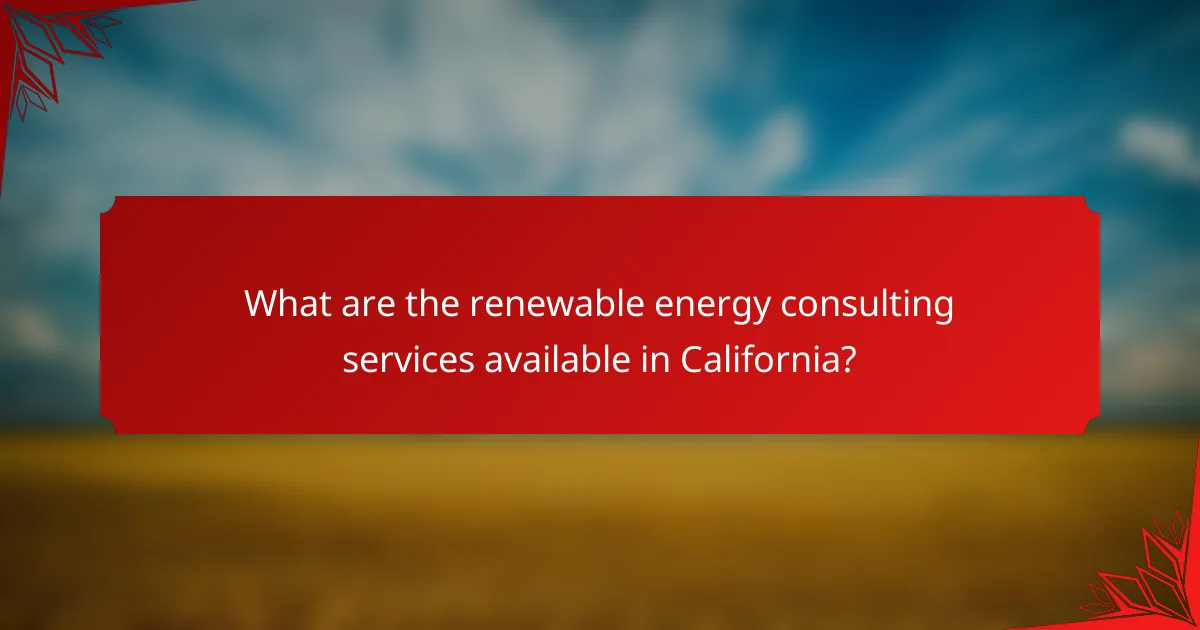
What are the renewable energy consulting services available in California?
California offers a range of renewable energy consulting services designed to help individuals and businesses navigate the complexities of adopting sustainable energy solutions. These services include expert guidance on solar and wind energy, energy efficiency audits, and regulatory compliance assistance tailored to state-specific incentives and requirements.
Solar energy consulting
Solar energy consulting in California focuses on helping clients assess their solar potential, select appropriate technologies, and navigate financing options. Consultants often provide site assessments to determine the best solar system size and configuration, considering factors like roof orientation and shading.
Clients can expect assistance with understanding available incentives, such as the California Solar Initiative, which can significantly reduce upfront costs. Additionally, consultants guide clients through the permitting process, ensuring compliance with local regulations.
Wind energy consulting
Wind energy consulting services assist clients in evaluating the feasibility of wind projects, including site selection and wind resource assessment. Consultants analyze wind patterns and potential energy output to determine the viability of installing wind turbines.
In California, where wind energy is a growing sector, consultants help clients understand state-specific incentives and financing options, such as the Self-Generation Incentive Program. They also provide support in navigating the regulatory landscape, including environmental assessments and permitting requirements.
Energy efficiency audits
Energy efficiency audits identify opportunities for reducing energy consumption and improving overall efficiency in buildings. Consultants conduct thorough assessments, examining insulation, HVAC systems, and lighting to recommend cost-effective upgrades.
In California, these audits can help clients qualify for various rebate programs and incentives aimed at promoting energy efficiency. By implementing recommended changes, businesses and homeowners can often achieve energy savings of 10-30%, leading to lower utility bills and a reduced carbon footprint.
Regulatory compliance assistance
Regulatory compliance assistance ensures that renewable energy projects meet all necessary state and local regulations. Consultants help clients understand the complex legal landscape, including interconnection standards and environmental regulations specific to California.
By providing guidance on compliance with laws such as the California Environmental Quality Act (CEQA) and the California Public Utilities Commission (CPUC) requirements, consultants help clients avoid costly delays and penalties. This service is crucial for ensuring that renewable energy projects are not only viable but also legally sound.

What state-specific incentives are available for renewable energy in Texas?
Texas offers various incentives for renewable energy adoption, including tax exemptions, federal credits, and local utility rebates. These programs aim to reduce the financial burden of installing renewable energy systems, making them more accessible for residents and businesses.
Texas Renewable Energy Tax Exemption
The Texas Renewable Energy Tax Exemption allows property owners to exempt the value added by renewable energy installations from property taxes. This means that if you install solar panels or wind turbines, the increase in your property’s value won’t affect your tax bill.
To qualify, the renewable energy system must be installed on your property and meet specific guidelines set by the state. This exemption can significantly lower the overall cost of ownership, making renewable energy more appealing for homeowners and businesses alike.
Federal Investment Tax Credit (ITC)
The Federal Investment Tax Credit (ITC) provides a substantial tax credit for solar energy systems, allowing you to deduct a percentage of the installation costs from your federal taxes. As of now, the ITC offers a credit of around 30% for systems installed before the end of 2032.
To take advantage of the ITC, ensure your solar system meets the necessary requirements, including being newly installed and operational. This credit can lead to significant savings, especially when combined with state incentives like the Texas Renewable Energy Tax Exemption.
Local utility rebates
Many local utilities in Texas offer rebates for renewable energy installations, which can further reduce upfront costs. These rebates vary by utility provider and can cover a portion of the installation expenses for solar panels, wind turbines, and energy efficiency upgrades.
To find available rebates, check with your local utility company or their website. Be aware that these programs often have limited funding and may require applications to secure the rebate, so it’s wise to act quickly once you decide to install a renewable energy system.
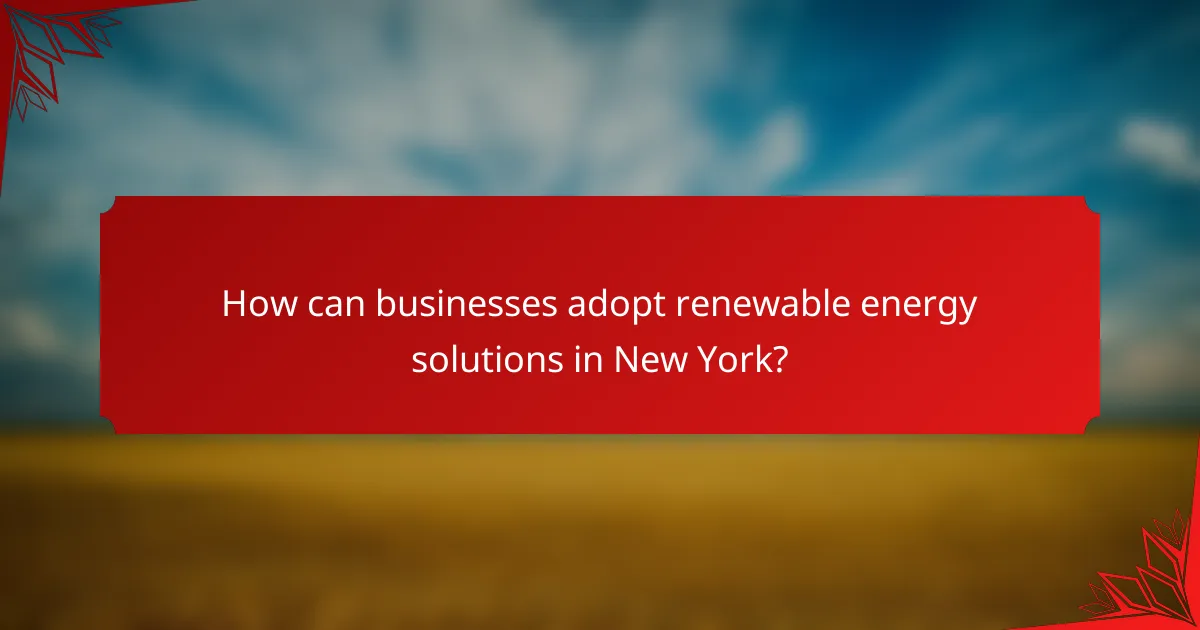
How can businesses adopt renewable energy solutions in New York?
Businesses in New York can adopt renewable energy solutions through various incentives and programs designed to facilitate the transition. Key options include energy storage systems, community solar programs, and Power Purchase Agreements (PPAs), each offering unique benefits and considerations.
Energy storage systems
Energy storage systems allow businesses to store excess energy generated from renewable sources, such as solar or wind, for later use. This can enhance energy reliability and reduce costs during peak demand periods. In New York, businesses can benefit from state incentives that support the installation of battery storage systems.
When considering energy storage, evaluate the size and capacity needed based on your energy consumption patterns. Systems can vary widely in cost, typically ranging from several thousand to tens of thousands of dollars, depending on the technology and scale.
Community solar programs
Community solar programs enable businesses to participate in solar energy generation without needing to install panels on-site. Instead, they can subscribe to a local solar farm and receive credits on their utility bills based on their share of the energy produced. This is particularly beneficial for businesses with limited roof space or those that rent their facilities.
In New York, community solar projects are growing, and businesses can often save around 10-20% on their energy costs by participating. It’s essential to research available programs and ensure they align with your energy needs and budget.
Power Purchase Agreements (PPAs)
Power Purchase Agreements (PPAs) are contracts between businesses and energy providers to purchase renewable energy at a fixed rate over a specified period. This arrangement can provide cost predictability and often lower energy costs compared to traditional utility rates. In New York, PPAs can be structured to include on-site generation or off-site renewable projects.
When entering a PPA, consider the length of the agreement and the potential for price fluctuations. Businesses should also assess the creditworthiness of the energy provider to mitigate risks. Engaging with legal and financial advisors can help ensure favorable terms and compliance with local regulations.

What are the benefits of renewable energy consulting?
Renewable energy consulting offers significant advantages, including financial savings, expert insights, and enhanced sustainability practices. By leveraging specialized knowledge, businesses and homeowners can make informed decisions that align with their energy goals.
Cost savings on energy bills
One of the primary benefits of renewable energy consulting is the potential for substantial cost savings on energy bills. By transitioning to renewable sources, such as solar or wind, users can reduce their reliance on traditional energy providers, which often leads to lower monthly expenses.
Consultants can help identify the most cost-effective renewable solutions tailored to specific needs. For instance, a solar panel installation can lead to savings of 20-50% on electricity costs, depending on local energy prices and incentives.
Access to expert knowledge
Renewable energy consultants provide access to specialized knowledge that can significantly enhance decision-making. They stay updated on the latest technologies, regulations, and financial incentives available in specific regions, ensuring clients benefit from the most relevant information.
Consultants can guide clients through the complexities of renewable energy options, helping to navigate local incentives and rebates. This expertise can be invaluable for maximizing return on investment and ensuring compliance with local regulations.
Improved sustainability practices
Engaging with renewable energy consulting promotes improved sustainability practices by integrating eco-friendly solutions into everyday operations. Consultants can assess current energy usage and recommend strategies to reduce carbon footprints and enhance overall environmental impact.
For example, businesses may adopt energy-efficient technologies or shift to renewable sources, contributing to corporate social responsibility goals. This not only helps the environment but can also enhance brand reputation and attract environmentally conscious consumers.

What criteria should businesses consider when choosing a renewable energy consultant?
Businesses should evaluate a renewable energy consultant based on their expertise in the specific energy sector, proven success through client testimonials, and familiarity with local regulations. These factors ensure that the consultant can effectively address the unique needs and challenges of the business in the renewable energy landscape.
Experience in the specific energy sector
When selecting a renewable energy consultant, prioritize their experience in your specific energy sector, such as solar, wind, or biomass. A consultant with a strong background in your area will better understand the technologies, market dynamics, and potential challenges you may face.
Look for consultants who have worked on projects similar to yours, as this familiarity can lead to more effective strategies and solutions. For example, a consultant with extensive solar project experience will be more adept at navigating the complexities of solar panel installation and financing.
Client testimonials and case studies
Client testimonials and case studies provide valuable insights into a consultant’s capabilities and reliability. Seek out feedback from previous clients to gauge their satisfaction and the consultant’s effectiveness in delivering results.
Review case studies that showcase successful projects, including details on the challenges faced and the solutions implemented. This information can help you assess whether the consultant has a proven track record of achieving desired outcomes in similar situations.
Knowledge of local regulations
A deep understanding of local regulations is crucial when choosing a renewable energy consultant. Regulations can vary significantly by region, impacting project feasibility, incentives, and compliance requirements.
Consultants should be well-versed in the relevant laws and incentives in your area, such as tax credits or renewable energy certificates. This knowledge can help you navigate the regulatory landscape more effectively and maximize potential benefits for your renewable energy projects.
